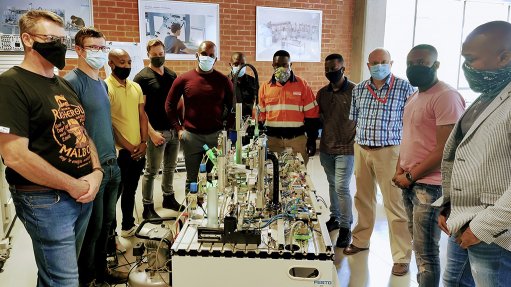
FIRST INTAKE The new mechatronics training course forms part of Sandvik Mining and Rock Solutions’ Southern African operations’ comprehensive apprenticeship programme
Sandvik Mining and Rock Solutions’ South African operation has introduced a 12-month mechatronic training programme. The first intake of ten apprentices was in January and the second intake will take place in July.
“There is a shift across the market towards using more intelligent machines. The South African workforce’s skills set is not necessarily well suited to these kinds of machines yet, and it is important to develop the necessary skills to respond to the ever-changing business environment,” explains Sandvik Southern Africa human resources development manager Vusi Mnguni, adding that this programme will ready the workforce for Industry 4.0.
Mechatronics is an interdisciplinary branch of engineering that focuses on the engineering of mechanical and electronic engineering systems. As technology has evolved, mechatronics also refers to a combination of engineering in the fields of robotics, electronics, computers, telecommunications, systems, controls, and products, among others.
Mnguni says about 80% of the mechatronics programme currently focuses its content on millwrights because trained millwrights will have had exposure to the electronic and mechanical elements of equipment.
However, other trades are not excluded. One of the reasons why millwrights are favoured for the programme is that they tend to require a shorter training period to successfully transition into becoming mechatronics technicians, Mnguni elaborates.
The training course forms part of Sandvik Mining and Rock Solutions’ Southern African operations’ comprehensive apprenticeship programme, which has been running for 20 years.
“We have had a consistent retention rate of about 86%, the bulk of whom are absorbed into the company as employees,” says Mnguni.
Under the apprenticeship programme, the business has trained more than 1 000 participants in various categories of artisanship.
Its apprenticeships are based on the idea that 70% of the training should involve some form of practical experience.
Mnguni says some key advantages of experience-based training include a virtual offering in real time and real-world experience, as well as opportunities to practise and acquire competences in maintenance on virtual environments.
“In fact, it goes so far as having the apprentices take apart and rebuild some of the equipment from scratch.”
Sandvik also provides a learnership programme to upskill university graduates in areas such as engineering, finance, marketing, human resources, procurement and legal.